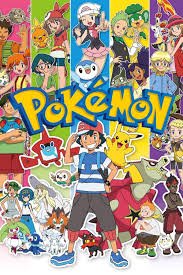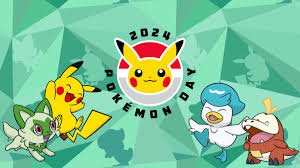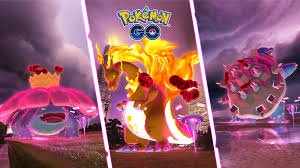Introduction of Pokemon:
Pokémon, short for “Pocket Monsters,” is one of the most iconic and enduring entertainment franchises in the world. Since its debut in 1996, Pokémon has captivated audiences across multiple generations through games, TV shows, trading cards, and merchandise. This article explores the fascinating universe of Pokémon, its history, impact, and reasons behind its timeless popularity.

A Brief History of Pokémon
Pokémon was created by Satoshi Tajiri and Ken Sugimori, with the first games, Pokémon Red and Pokémon Green (later released as Pokémon Blue internationally), launching for the Nintendo Game Boy in 1996. Inspired by Tajiri’s childhood hobby of collecting insects, the core concept of the series revolves around capturing, training, and battling creatures called Pokémon. Published by Nintendo, Game Freak, and Creatures, the franchise quickly expanded beyond video games to include:
- Trading card games
- Animated TV series and movies
- Merchandise
- Mobile games like Pokémon GO
By seamlessly blending gaming, storytelling, and community-building, Pokémon became a cultural phenomenon that continues to thrive.
What Are Pokémon?
Pokémon are fictional creatures with various abilities, appearances, and types. Trainers, players of the game, catch Pokémon using Poké Balls and form teams to compete against others. As of 2024, there are over 1,000 Pokémon species, each belonging to one or more of 18 types, such as Fire, Water, Grass, Electric, and Psychic.
Some iconic Pokémon include:
- Pikachu: The franchise mascot, an Electric-type Pokémon known for its yellow fur and lovable nature.
- Charizard: A Fire/Flying-type dragon that is a fan favorite.
- Mewtwo: A legendary Psychic-type Pokémon with immense power.
- Eevee: Known for its multiple evolutionary paths, making it versatile and unique.

The Core Gameplay Mechanics
Pokémon games are renowned for their engaging mechanics. The main series follows a role-playing game (RPG) format with these key elements:
1. Catching Pokémon
Players explore various regions filled with wild Pokémon. Using Poké Balls, they can capture and add these creatures to their teams.
2. Battling
Battles are turn-based, where players use their Pokémon’s moves to defeat opponents. Strategy is key, as type matchups (e.g., Water beats Fire) play a significant role.
3. Training and Evolving
Captured Pokémon gain experience points (XP) through battles, leveling up and sometimes evolving into stronger forms.
4. Exploration
Players navigate through expansive regions, solving puzzles, encountering rival trainers, and battling gym leaders to earn badges.
The Animated Series
The Pokémon animated series debuted in 1997 and follows the adventures of Ash Ketchum, a young trainer from Pallet Town, and his loyal Pikachu. Together, they travel across various regions, striving to become Pokémon Masters. With over 25 seasons and over 1,200 episodes, the anime has introduced fans to:
- New Pokémon species and regions
- Heartwarming stories about friendship and perseverance
- Iconic characters like Misty, Brock, Team Rocket, and Professor Oak
Movies, such as Pokémon: The First Movie and Pokémon Detective Pikachu, have further enriched the franchise’s storytelling.The Trading Card Game (TCG)
Launched in 1996, the Pokémon TCG remains one of the most popular card games globally. Players build decks featuring their favorite Pokémon and compete to knock out opponents’ cards. The game’s enduring appeal lies in its strategic depth, vibrant artwork, and collectability. Rare cards like holographic Charizard have become highly sought-after collectibles, often fetching thousands of dollars.
Mobile Games and Augmented Reality
The franchise expanded into mobile gaming with Pokémon GO in 2016. This augmented reality (AR) game revolutionized the industry by blending real-world exploration with Pokémon-catching mechanics. Players used their smartphones to:
- Discover Pokémon in real-world locations
- Participate in raids and events
- Engage in community-driven gameplay
Pokémon GO was a global sensation, attracting millions of players and encouraging outdoor activity.
Cultural Impact
Pokémon’s influence extends beyond gaming and entertainment:
- Pop Culture Icon: Pikachu has become a globally recognized symbol, appearing in parades, advertisements, and even on airplanes.
- Educational Value: The games teach players about strategy, critical thinking, and teamwork.
- Community Building: Events like Pokémon World Championships foster a sense of camaraderie among fans.
- Merchandising Powerhouse: From toys to apparel, Pokémon’s merchandise line is a multi-billion-dollar industry.
Regions and Generations
Each Pokémon game introduces a new region and generation of Pokémon. These regions are inspired by real-world locations:
- Kanto: The original region, inspired by Japan’s Kantō region.
- Johto: Linked to Kanto, inspired by western Japan.
- Sinnoh: Known for its mythology and cold climate, inspired by Hokkaido.
- Unova: Inspired by New York City.
- Galar: A UK-inspired region introduced in Pokémon Sword and Pokémon Shield.
- Paldea: A Mediterranean-inspired region introduced in Pokémon Scarlet and Pokémon Violet.
These diverse regions keep the series fresh and exciting.
Why Is Pokémon So Popular?
- Nostalgia: Many fans grew up with Pokémon, creating a lifelong bond with the franchise.
- Accessibility: The games are easy to pick up yet offer depth for advanced players.
- Diverse Offerings: From casual mobile games to competitive TCG tournaments, there’s something for everyone.
- Community Engagement: Events, online forums, and fan art foster a strong, active community.
- Innovations: The franchise consistently evolves, introducing new gameplay mechanics, stories, and technologies.

Looking Ahead
Pokémon shows no signs of slowing down. Upcoming developments include:
- New Game Releases: Game Freak continues to expand the main series and spin-offs.
- Expanded Media: The success of Detective Pikachu hints at more live-action projects.
- Technological Innovations: Future AR and VR applications could further immerse fans in the Pokémon world.
- Environmental Themes: Recent games emphasize conservation and harmony with nature, resonating with modern audiences.
Conclusion
Pokémon is more than just a franchise; it’s a cultural phenomenon that bridges generations. Its universal themes of friendship, adventure, and perseverance resonate with fans worldwide. Whether you’re a gamer, collector, or casual viewer, the world of Pokémon offers endless possibilities for exploration and enjoyment. As it continues to innovate and inspire, Pokémon remains a timeless testament to the power of imagination and storytelling.
